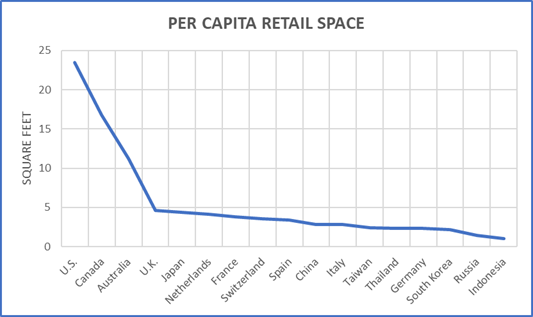The coming economic crisis will now spell even further grief for the retail sector—where over 52 million Americans are employed. This is about 25% of the workforce.
The industry is now lining up to seek financial relief—pleading that the Covid-19 outbreak will bring “failure.” Already devastated by Amazon and other e-retailers, the picture for “bricks-and- mortar” stores is grim indeed. But does it thereby follow that they deserve financial assistance to remain at their present scale?
Below is a graph depicting a comparison of square feet of retail space per capita.

We have always known that Americans are devoted to their shopping malls. Here is graphic evidence of that. We have 23.5 square feet of retail space per person. Next comes our dear neighbor Canada—mildly infected by the same fetish at 16.8 square feet. The Australians show similar tastes at 11.2 square feet.
Then come the real pikers in this game—the UK (4.6), Japan (4.4), Netherlands (4.1), France (3.8) and then the rest—poor Germany is down there at 2.3 square feet per person (somewhat above Indonesia).
It seems we have over 6 times more retail space than the French, and over 10 times the retail space available to the Germans. How do their consumers possibly manage to cope with such a paucity of places to spend their money?
But of course we also see that retail sector employs approximately 25 % of the workforce. Uh oh….
It seems that if there is a severe restructuring (a euphemism for failures and closures) of the retail sector—already underway thanks to Amazon and other e-commerce—job loss will be severe.
Hmmm. This is not the dreaded automation—it is simply an outdated business model.
We see two things now underway. First, a number of businesses and sectors are going to be seriously affected by this. Second, there will be an acceleration in the number of businesses and sectors pleading for financial help (in the jargon, a “bailout”).
We have a saying in economics—”capitalism eats its children.” That is what makes a market economy “dynamic” and adaptable. One-half of new firms die within five years. Old ones die
off, and so do many of the new ones. No firm deserves not to die—they must earn their way. They have no moral or financial claim on society.
But now, lots of firms will die, and sectors will be devastated. Financial assistance to “save” them will be a waste of money–they will eventually die. The political and cultural challenge will now turn our attention to how might we meliorate the economic and social trauma associated with this acceleration of closures and demise.
America has never been very good at stepping in to “pick up the pieces” from job losses. It is a tough world out there—America is no place for the timid. Firms have closed, moved away, or automated. We have told people to move to where the jobs are. That is easier said than done (think West Virginia, southern Ohio, the rest of Appalachia). In economic terms, we have “stranded labor.”
But now the “stranding” is going to be far more widely distributed—not confined to places left behind. This will not be pretty. On the other hand, what a perfect time for an election.
It is too easy to imagine that elections are about voting. That is wrong. Elections are about “reason giving”—a large-scale collective argument over which is the better way forward.
This one will be a serious conversation about the way forward. We have never had an election quite like this one will be.
Dr. Daniel Bromley can be contact at dbromley@wisc.edu.